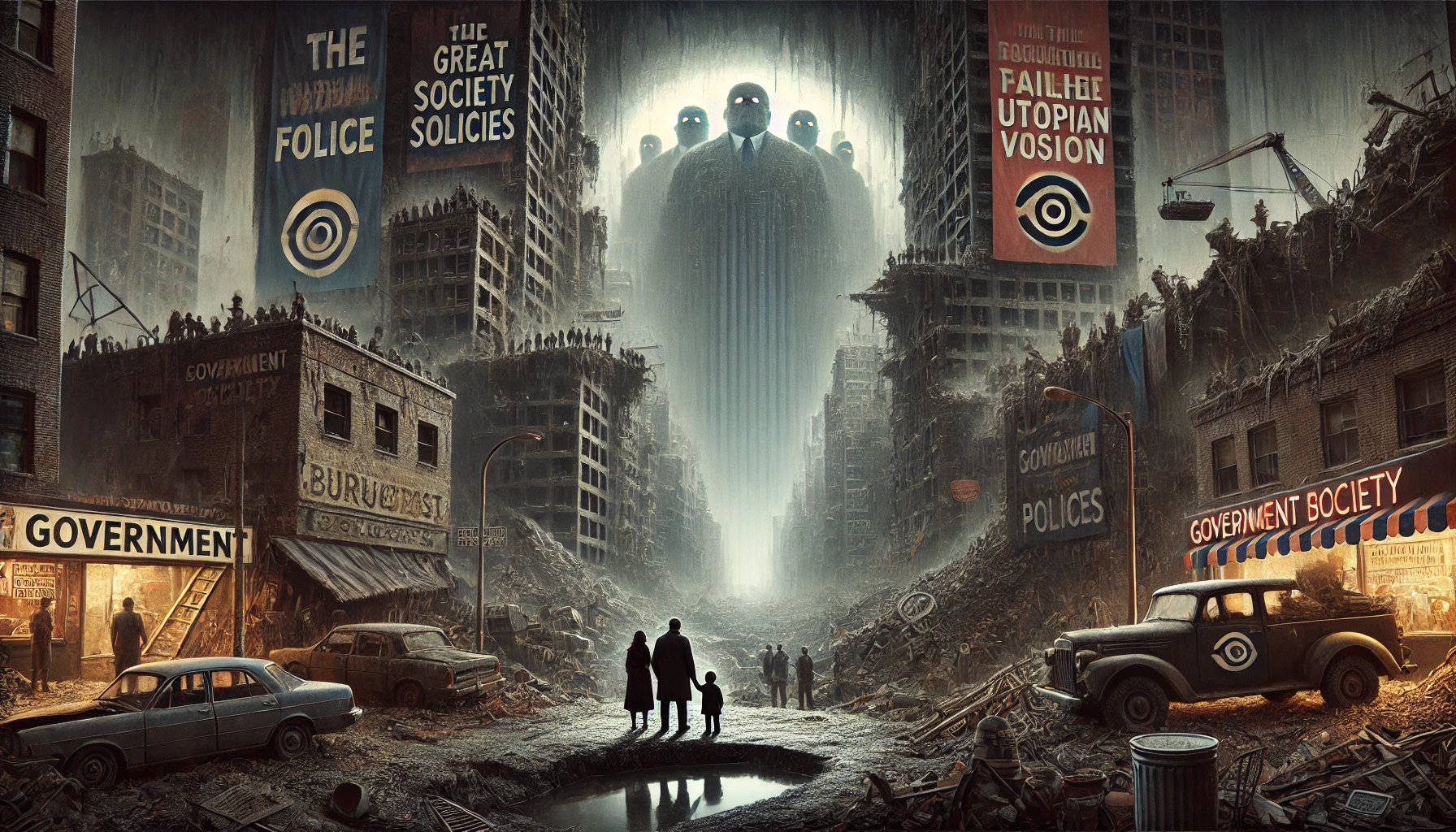It is one of the great ironies of history that revolutions, however well-intentioned, tend to sow the seeds of their own undoing. The Great Society, launched by President Lyndon B. Johnson, was heralded as a beacon of progress, a promise of an America lifted from the depths of poverty and social discord into a new utopian ideal. And yet, in its wake, what we observe is not a society elevated to prosperity and cohesion but rather an unraveling, a slow-motion implosion of the very institutions that once bound the nation together.
The Great Society, in its monumental ambition, was predicated on an implicit assumption: that central planning, bureaucratic intervention, and the dismantling of traditional structures in favor of state-led paternalism would result in a flourishing of individual well-being. But here lies the fallacy—one of arrogance and myopia. For a civilization is not sustained by government intervention alone. It is not a machine with interchangeable parts that can be optimized at will by well-meaning technocrats. Rather, it is an intricate tapestry woven from history, culture, tradition, and the organic evolution of family and community. To rip at those threads under the guise of progress is to risk unraveling the entire fabric of society.
At its core, the Great Society represented a profound shift in the relationship between the citizen and the state. Where once the primary unit of responsibility and resilience was the family, under Johnson’s grand vision, the government stepped in as provider, protector, and moral arbiter. It sought to supplant individual responsibility with institutional largesse. And what was the result? A catastrophic explosion in single-parent households, a generational cycle of dependency, and a deeply entrenched bureaucracy that not only failed to alleviate poverty but perpetuated it.
Daniel Patrick Moynihan, one of the few voices of caution during the era, presciently warned of the consequences of incentivizing single motherhood and dismantling paternal responsibility. His warnings went unheeded. Fifty years later, the statistics bear grim testament to his foresight: a rise in illegitimacy rates from 25% in 1965 among black children to an astounding 72% in 2015. Among the general population, out-of-wedlock births climbed from 4% to over 40%. The nuclear family, the bedrock of social stability, was systematically eroded under the guise of liberation.
This decay has ramifications beyond the immediate distress of fatherless homes. Crime, economic stagnation, educational decline—these are the downstream consequences of a social experiment untethered from reality. The very communities the Great Society aimed to uplift were instead caught in a web of dependence and dysfunction. Cities once vibrant with industry and opportunity became hollowed-out husks, wracked by crime, drugs, and systemic disrepair.
The war on poverty, declared with such conviction in the 1960s, has not been won. It has not even been meaningfully engaged on the terms that matter. Instead, trillions of dollars have been funneled into bureaucracies that sustain themselves on the perpetuation of hardship rather than its resolution. It is a parasitic arrangement, one in which the state metastasizes while the individual atrophies.
The Great Society did not merely expand government; it redefined governance. The legislative leviathan that emerged in the wake of Johnson’s reforms did not simply redistribute wealth; it redistributed authority, stripping local communities of their autonomy and consolidating power within an opaque, unaccountable administrative state. The result? An ever-growing chasm between the governed and the governing—a political class increasingly detached from the realities of those it claims to serve.
And what of education? Once a domain of local control and familial investment, it became a bureaucratic monolith under the federal government’s expanding purview. The Elementary and Secondary Education Act, the Higher Education Act—these legislative endeavors promised a new dawn of enlightenment. Instead, they precipitated an era of plummeting academic standards, ideological homogenization, and the financial devastation of student loan debt. Colleges, bloated with federal funding, evolved from institutions of rigorous intellectual pursuit into ideological factories, churning out graduates steeped in grievance but bereft of useful skills.
Perhaps the greatest indictment of the Great Society is its utter failure to confront the deeper, existential question: What sustains a civilization? It is not welfare checks. It is not vast regulatory agencies. It is not an ever-expanding state. Civilization is upheld by strong families, by moral responsibility, by the sacred institutions that provide order and meaning. The Great Society, in its hubris, sought to replace these with social engineering, believing that the wisdom of central planners could outstrip the accumulated knowledge of centuries. It was a profound miscalculation.
We now inhabit the aftermath. An America divided, its social fabric tattered, its institutions crumbling under the weight of their own contradictions. The very real inequalities that exist today are not, as some would have it, merely the residual stains of historical injustice; they are the direct result of policies that undermined the fundamental structures of stability. The abandonment of the family, the erosion of personal accountability, the expansion of a faceless bureaucracy—all of these trends find their origins in the utopian conceits of the Great Society.
What, then, is the path forward? It is certainly not a doubling down on the failures of the past. It is not in further government intrusion, nor in empty platitudes of progress. The way forward is a return to first principles: the restoration of the family as the central unit of social organization, the rekindling of individual responsibility, and the dismantling of the bloated administrative state that has so thoroughly distorted the social contract.
Johnson’s Great Society promised an America ascendant. Instead, it delivered an America fractured. The price of this grand experiment has been incalculable, not merely in economic terms, but in the erosion of that which makes life meaningful. If there is any lesson to be drawn from the past fifty years, it is this: a society cannot be engineered into greatness. It must be built upon the enduring foundations of virtue, responsibility, and moral order. Without these, all promises of progress are mere illusions, and all great societies, however noble in intention, are destined for collapse.


